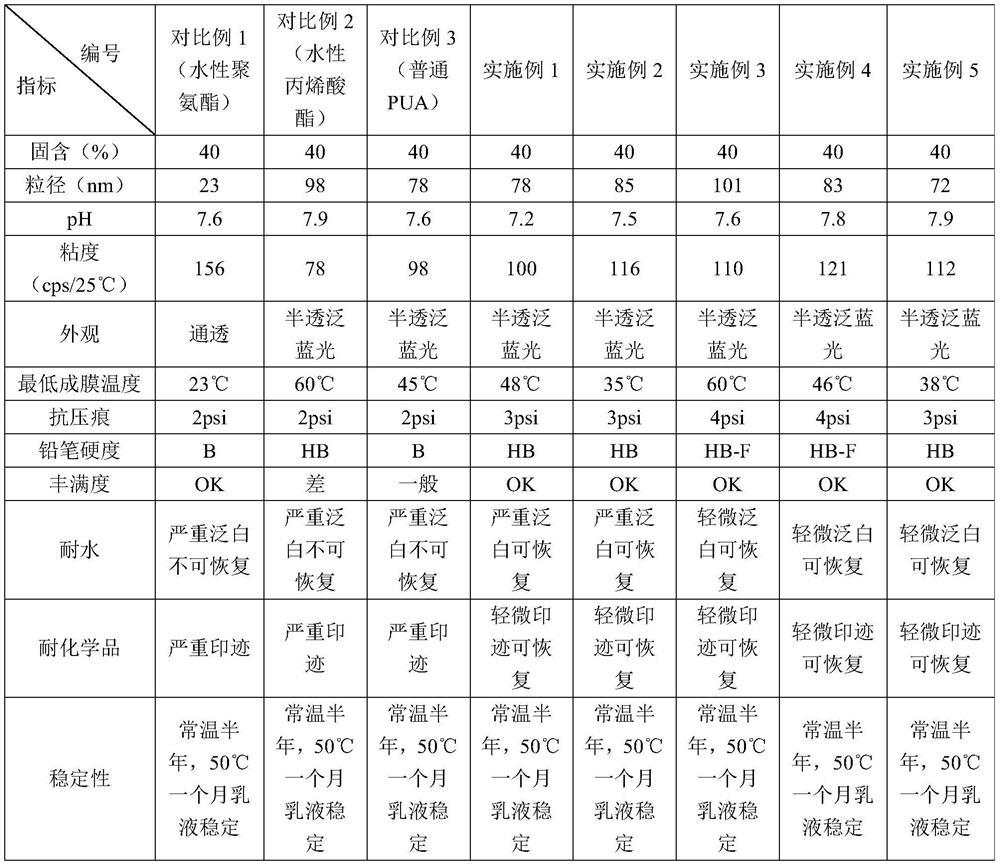Modified waterborne polyurethane resin, its preparation method and application
A water-based polyurethane and polyurethane resin technology, applied in the field of wood varnish coatings, can solve the problems that the performance requirements of wood varnishes cannot be met, it is difficult to prepare a small particle size transparent emulsion, and it is difficult for customers to meet the performance requirements, etc., to achieve excellent adhesion effect, The effect of obvious performance advantages and high construction efficiency
- Summary
- Abstract
- Description
- Claims
- Application Information
AI Technical Summary
Problems solved by technology
Method used
Image
Examples
Embodiment 1
[0100] Add 72g HMDI (dicyclohexylmethane diisocyanate), 100g PTMEG1000 (polytetrahydrofuran ether glycol), 0.06g8108 catalyst, heat up to 80°C for 1h, cool down to below 60°C, add 5.4g trimethylolpropane, 14.6g dimethylolpropane Propionic acid, 1.2g of 1,4-butanediol, and 58g of acetone were heated to 75°C for reaction. Samples were taken every 1 hour to measure NCO until the NCO reached the theoretical value and the reaction was stopped.
[0101] Cool down to below 60°C (between 50-60°C), add 130g acetone, 11.6g tetrahydrofuran acrylate, 23.2g 3-amino-4,4,4-trifluorobutenoic acid ethyl ester, 46.4g styrene, 150.8g Methyl methacrylate, mix to dissolve.
[0102] Lower the temperature to below 40°C and add 11g of triethylamine, and time the reaction for 5 minutes.
[0103] The prepared prepolymer was poured into a dispersion cup, and 638 g of water was added under a high-speed shear condition of 1500 r / min to obtain a water-based polyurethane-acrylate mixed emulsion. Then 2....
Embodiment 2
[0107] Add 86g HMDI (dicyclohexylmethane diisocyanate), 100g PPG2000 (polypropylene oxide ether glycol), 0.06g8108 catalyst, heat up to 80°C for 1h, cool down to below 60°C, add 6g trimethylolpropane, 16g dimethylol Propionic acid, 2g 1,4-butanediol, 60g acetone, heat up to 75°C for reaction, take samples every 1h to measure NCO, until NCO reaches the theoretical value, stop the reaction.
[0108] Cool down to below 60°C (between 50-60°C), add 134g acetone, 12.5g tetrahydrofuran acrylate, 25g 3-amino-4,4,4-trifluorobutenoic acid ethyl ester, 50.4g styrene, 164.1g formazan methyl acrylate, mix to dissolve.
[0109] Cool down to below 40°C and add 12.06g of triethylamine to neutralize for 5 minutes.
[0110] The prepared prepolymer was poured into a dispersion cup, and 693g of water was added under the condition of high shear of 1500r / min to obtain a water-based polyurethane-acrylate mixed emulsion, and then 2.8g of ethylenediamine was added for chain extension reaction.
[...
Embodiment 3
[0114] Add 86g HMDI (dicyclohexylmethane diisocyanate), 100g PTMEG2000 (polytetrahydrofuran ether glycol), 0.06g8108 catalyst, heat up to 80°C for 1h, cool down to below 60°C, add 6g trimethylolpropane, 16g dimethylolpropionic acid , 2g 1,4-butanediol, 60g acetone, heat up to 75°C to react, take samples every 1h to measure NCO, until NCO reaches the theoretical value, stop the reaction.
[0115] Cool down to below 60°C (between 50-60°C), add 134g acetone, 14.7g tetrahydrofuran acrylate, 29.4g 3-amino-4,4,4-trifluorobutenoic acid ethyl ester, 58.8g styrene, 186.1g Methyl methacrylate, mix to dissolve.
[0116] Cool down to below 40°C and add 12.06g of triethylamine to neutralize for 5 minutes.
[0117] The prepared prepolymer was poured into a dispersing cup, and 753 g of water was added under a high-speed shear condition of 1500 r / min to obtain a water-based polyurethane-acrylate mixed emulsion, and then 2.8 g of ethylenediamine was added for chain extension reaction.
[0...
PUM
| Property | Measurement | Unit |
|---|---|---|
| boiling point | aaaaa | aaaaa |
| size | aaaaa | aaaaa |
| hydroxyl value | aaaaa | aaaaa |
Abstract
Description
Claims
Application Information
 Login to View More
Login to View More - Generate Ideas
- Intellectual Property
- Life Sciences
- Materials
- Tech Scout
- Unparalleled Data Quality
- Higher Quality Content
- 60% Fewer Hallucinations
Browse by: Latest US Patents, China's latest patents, Technical Efficacy Thesaurus, Application Domain, Technology Topic, Popular Technical Reports.
© 2025 PatSnap. All rights reserved.Legal|Privacy policy|Modern Slavery Act Transparency Statement|Sitemap|About US| Contact US: help@patsnap.com

